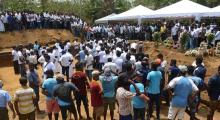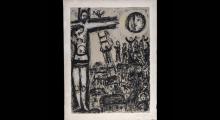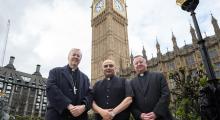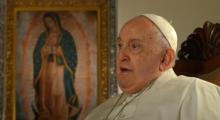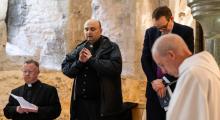Issued by the Catholic Center for Studies and Media - Jordan. Editor-in-chief Fr. Rif'at Bader - موقع أبونا abouna.org
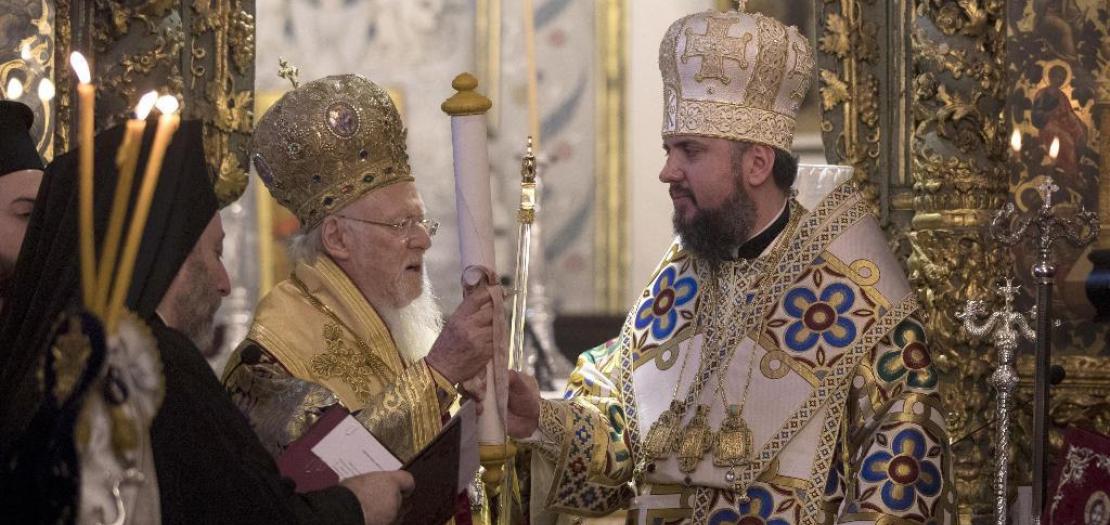
Pope Francis’ next trips on the agenda are fatally destined to cross the storm that is rocking the Orthodox Churches of Byzantine origin. A storm so far concentrated in Ukraine, but that could soon widen sucking into its vortex other lacerations - latent or acclaimed - already marking the body of the whole Orthodoxy.
The Macedonian puzzle
The official announcement of Pope Francis’ visit to Romania (31 May-2 June) was recently released. But first, in the same month traditionally dedicated to Our Lady (May 5-6), the Bishop of Rome will make a flash trip to Bulgaria and Macedonia, landing in one of the faults where the intra-Orthodox tensions are more vehemently discharged. Throughout history, the Orthodox communities of the present Macedonian territories have been subject to the jurisdiction of the Bulgarian Church and then to the direct jurisdiction of the Ecumenical Patriarchate, before passing - from the early decades of the 20th century onwards, under the direction of the Serbian Orthodox Church.
In 1967, the Macedonian metropolitans decided to break away from the Serbian Patriarchate and proclaim their own autocephaly (independence). Since then, and until now, no other Orthodox Church has recognized the canonical legitimacy of the "schismatic" Macedonian Orthodox Church.
In recent years, Macedonian Orthodox hierarchs have tried to reconnect at least with the Bulgarian Church, declaring themselves willing to recognize it as their own "Mother Church". Up Until the end of May 2018, when the controversy between Constantinople and Moscow over the project of autocephaly of Ukrainian Orthodoxy had already begun, the Ecumenical Patriarchate of Constantinople announced its intention to take charge also of the "Macedonian issue" (after receiving a letter in which the Prime Minister of Macedonia, Zoran Zaev, declared that he supported the request for autocephaly coming from the ecclesiastics of his country). Now that all the members of the Synod of the Patriarchate of Constantinople have signed the Decree granting autocephaly to the new Ukrainian Orthodox Church now independent from the Moscow Patriarchate, exponents of the Serbian Orthodox Church speculate (and fear) that the same scheme could be repeated in Macedonia, with the Ecumenical Patriarch willing to canonically re-legitimize the Macedonian "schismatic" Orthodox and to grant them full independence of the Serbian Patriarchate. Perhaps that is also why the Serbian Orthodox Patriarch Irinej has so far been one of the most determined Orthodox Primates to try crushing the concession of autocephaly to the Ukrainian Orthodox Church, calling into question in his Christmas message "angry chauvinists, the Russophobes, led by corrupted politicians " who "with the assistance of Uniates, and unfortunately with the non-canonical participation of the Patriarchate of Constantinople, have deepened and spread the existing schisms and have seriously endangered the unity of Orthodoxy in its entirety".
With regard to the new interventionism of the Ecumenical Patriarchate in the controversial situations that fuel conflict and cut off from Orthodox communion large groups of faithful - as has happened for decades in the cases cited in Ukraine and Macedonia - several analysts have drawn attention to a passage included in the Tomos on autocephaly for Ukraine that seems to recognize robust prerogatives of the Constantinopolitan See as a guide and orientation towards the individual Orthodox Churches. "In the case of great questions of an ecclesiastical, doctrinal and canonical nature", one reads in the decree granting autocephaly to the Ukrainian Orthodox Church "the Metropolitan of Kiev and of the whole of Ukraine must, in the name of the Holy Synod of its Church, address our most holy patriarchal and ecumenical Throne, seeking his authoritative opinion and his final support".
Reactions and hesitations
After the handing over of the Tomos on autocephaly for Ukrainian Orthodox Church by the Ecumenical Patriarchate, an explicit support for the birth of the new Ukrainian Church was expressed by the U.S. Secretary of State Mike Pompeo, who in a statement dated 11 January described it as "a historic achievement as Ukraine seeks to chart its own future". Major Archbishop Sviatoslav Shevchuk, Primate of the Ukrainian Greek Catholic Church, also greeted with great emotion the birth of the Ukrainian autocephalous Orthodox Church, valuing it as a positive step toward the restoration of full communion among all the Ukrainian Churches: "Today - the head of the Ukrainian Greek-Catholics said in a manifesto interview - it is necessary to make every effort not only to overcome the division within Ukrainian Orthodoxy, but also to seriously theologize, pray, and work to restore the original unity of the Kiev Church in its Orthodox and Catholic branches. And the UGCC bears the mystical Church memory of the undivided Christianity of the first millennium. Although today we live in full communion with the successor of the Apostle Peter, we consider our Mother Church to be the Church of ancient Constantinople.” Meanwhile, the other Orthodox Churches, apart from the Patriarchate of Moscow, have not yet expressed official reactions to the proclaimed autocephaly of the Ukrainian Orthodox Church legitimized by the pronouncement of their respective synods. Some Orthodox Churches, such as that of Greece, have announced that the issue will be addressed at the next synodal meetings of their bishops. While some primates have already expressed opposition to the way in which autocephaly was granted, raising alarm on its potential consequences.
Yohanna X, Patriarch of the Greek Orthodox Church of Antioch, wrote on 31 December a letter addressed to Bartholomew, in which he invited the Ecumenical Patriarch "not to take any decision that does not express the consent of the Autocephalous Orthodox Churches", recalling that "it is unreasonable to put an end to a schism at the expense of the unity of the Orthodox world". After the handing over of the Tomos on autocephaly to the Ukrainian Metropolitan Epiphany, the efforts of persuasion of the parties involved also focused on the Patriarchate of Jerusalem: some bishops of the new Ukrainian autocephalous Church announced their intention to visit the Holy Land in the hope of being able to concelebrate with the Greek Orthodox Patriarch Theophilos and with other bishops of the Patriarchate of Jerusalem, also to attest to their canonical legitimacy. Not even the Holy Synod of the Patriarchate of Jerusalem has so far issued public statements on the final developments of the Ukrainian crisis. But previously, Patriarch Theophilos himself had always indicated Metropolitan Onufry, head of the Ukrainian Orthodox Church canonically linked to the Patriarchate of Moscow, as the only legitimate Ukrainian primate, who remained outside - with its ninety or so bishops - the "Council of Unification" that on 15 December elected Metropolitan Epiphany as primate of the "new" Ukrainian autocephalous Church. In recent days Theophilos himself met again with Metropolitan Hilarion of Volokolamsk, head of the department for external relations of the Patriarchate of Moscow, on a visit to the Holy City.
The Pope and the Orthodox “thorns”
As he is preparing to travel in Bulgaria, Macedonia and Romania, the Bishop of Rome does not seem to fear the risk of being caught up in the conflicts that is tearing apart the Orthodox. The papal indication that Catholic Churches must not "meddle" in the "internal affairs" of Orthodoxy--which Pope Francis reiterated on 30 May last, during a meeting with a delegation from the Patriarchate of Moscow--has contributed to creating a paradoxical situation: all the Orthodox leaders, while they are dividing themselves, look to the bishop of Rome with brotherly affection. They trust him. They count on his closeness. The Church of Rome, in this difficult moment, offers despite all odds its merciful service to unity also for the benefit of all Eastern Churches. And it does so without siding on one side or the other, without exploiting the other side’s difficulties to reaffirm ascendency, and without claiming roles as "arbiter" of ecclesial conflicts. On this uncharted path, the desire to return to full sacramental communion between Catholics and Orthodox can be guarded in hope. Even at a time when the tested paths of ecumenical dialogue are objectively made unfeasible by the divisions within Orthodoxy. And the painful Orthodox lacerations risk making those appeals to apply "synodal" organizational systems of ecclesial praxis all too abstract and idealistic.


